-
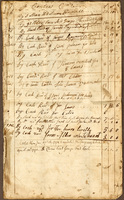 Whitehall Account- cash paid & received, 1789-1797
Whitehall Account- cash paid & received, 1789-1797 Cash paid and received at Whitehall for labor, goods, and services for both free and enslaved people. Payments to Noke, Yarm, and Merrit for harvest, cutting wood, ditching, and mowing marsh hay. There is also a payment in Chew's handwriting to Jacob Hill for shoes for Sharper, and an entry to "articles bought for sick people" and a quart of brandy for Cato.
-
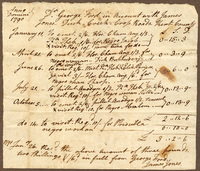 Doctor's bill for enslaved people at Duck Creek Crossroads, 1790
Doctor's bill for enslaved people at Duck Creek Crossroads, 1790 Dated "Anno Domini 1790", account between George Ford and James Jones for visits to enslaved people at Duck Creek Cross Roads [sic]. The first charge is for Negro Jacob on January 11, the second for "negro woman - Dick Butcher's Wife - Priscilla". Sharper, Scilla, Absalom, and Priscilla again.
-
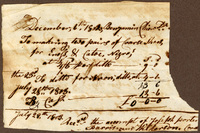 Payment for new shoes for Negros at Whitehall, 1802-1803
Payment for new shoes for Negros at Whitehall, 1802-1803 A receipt of payment to "making two pairs of coarse shoes" for Enos and Cato, followed by "Negros"- unsure if that is referring to the two named men, or additional laborers. New shoes were also made for Aaron.
-
 Note of payment from Joseph Porter to Merrit Allee for labor, marked by Merrit, September 05, 1799
Note of payment from Joseph Porter to Merrit Allee for labor, marked by Merrit, September 05, 1799 Payment from Joseph Porter to Merrit Allee for "dikking and mowing". Signed with an "X" by Merrit.
-
 Note of payment from George Ford to James Blundell potentially for medicine, September 03, 1976
Note of payment from George Ford to James Blundell potentially for medicine, September 03, 1976 Note of payment from George Ford to James Blundell potentially for medicine for Sharper, though the handwriting is not entirely clear.
-
 Payment to Dr. James Sykes for attending a Negro at Whitehall, 1800
Payment to Dr. James Sykes for attending a Negro at Whitehall, 1800 A receipt of payment to Dr. James Sykes from Benjamin Orange for medicine and attending Lucy Butcher, referred to in the second line as Negro.
-
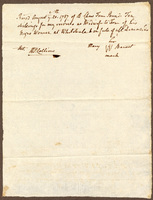 Mary Barnet paid by Benjamin Chew for services as midwife to Negro woman, August 20, 1787
Mary Barnet paid by Benjamin Chew for services as midwife to Negro woman, August 20, 1787 A receipt of payment to Mary Barnet from Benjamin Chew for four pounds and ten shillings for midwife services to a Negro woman at Whitehall. Signed by Mary with a mark in the shape of a "W".
-
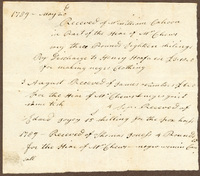 Note documenting purchases & hiring of two Negro workers for Whitehall, May-August 1789
Note documenting purchases & hiring of two Negro workers for Whitehall, May-August 1789 Note documenting the hire of Negro girl Tish and Negro woman Cansall, as well as payment to Henry Hoa___? (Hoffecker?) "for making negro clothing".
-
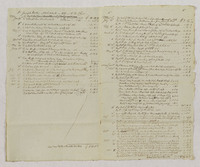 Account of Whitehall Overseer Joseph Porter with Benjamin Chew, 1799
Account of Whitehall Overseer Joseph Porter with Benjamin Chew, 1799 Account covering January-December 1799. Under expenses are the mending of something for Cato, and purchase of shoes for Yarm on February 8th. Jacob "Allee" for "making 4 suits of cloathes", payments to Pad, Prince, Yarm, and Merrit for different labor. Also an expense for 4 gallons of whiskey for the people cutting the marsh hay.
-
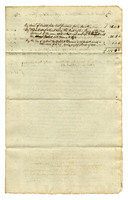 Account of Whitehall Overseer Joseph Porter with Benjamin Chew, 1802
Account of Whitehall Overseer Joseph Porter with Benjamin Chew, 1802 Payment to Noke for reaping and Merrit and Simon for scouring meadow ditch (with a note reading "hired because our own people had no boots"). Another payment to Merrit for (cover__?) corn, and multiple payments to Yarm "Alee" (Allen?) for mowing.
-
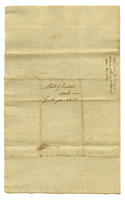 Account of harvest workers at Whitehall from Joseph Porter to Benjamin Chew, 1801
Account of harvest workers at Whitehall from Joseph Porter to Benjamin Chew, 1801 To note the Different Days work and what is had to Each hand & the Day &c for Harvest work?. Noke and Yarm are mentioned, both with "Allen" after their names.
-
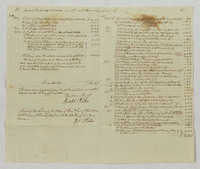 Account of Whitehall Overseer Joseph Porter with Benjamin Chew, January 11, 1803
Account of Whitehall Overseer Joseph Porter with Benjamin Chew, January 11, 1803 An account for Whitehall expenses, both paid and received. One of the first lines of cash received is from Sam Calhoun for the purchase of his wife, Latitia. The first $30 for of a total $90 in three payments. Also recorded is cash received from Meredith for a year's wages of Beck, from 1802-1803, as well as multiple payments for various work by Merrit. There is also payment for half a gallon of wine for sick Aaron.
-
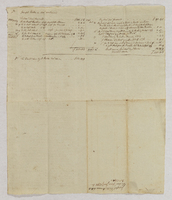 Account of Whitehall Overseer Joseph Porter with Benjamin Chew, 1789
Account of Whitehall Overseer Joseph Porter with Benjamin Chew, 1789 Detailed account for Whitehall expenses from 1789 with many payments to enslaved or potentially enslaved people for various work. Also includes payment for use of other's (hired?) enslaved people, such as a payment on May 2nd to Charles Nabb "for use of Merrit Lee". Other work includes Prince, Lid, George, and Merrit for harvesting and ditching, and Jem for cradling oats, Raymond for an ox yoke & bows, and Negro List (sp?) for stocking [?]. Sam Calhoun is also mentioned.
-
 Account of Whitehall Overseer Joseph Porter with Benjamin Chew, January 07, 1804
Account of Whitehall Overseer Joseph Porter with Benjamin Chew, January 07, 1804 Account for work done by Joseph Porter's wife, Sarah, starting in 1798, making clothes for the enslaved people of Whitehall. The work includes making a suit of linen for Dave, a coat for Ben, a pair of breaks for Jim, and many other shirts, trousers, suits of clth, and coats.
-
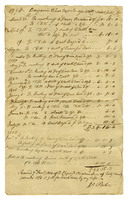 Account of Whitehall Overseer Joseph Porter with Benjamin Chew, 1804
Account of Whitehall Overseer Joseph Porter with Benjamin Chew, 1804 Begins with another cash received for the purchase by "Negro Sam Calhoun" for his wife, for a total of $90 in three payments of $30. The second line is payment from John Gibbs at Dover for the hire of "Negro Beck". There is also payment from Dover for the hiring of Lucey [Lucy] in 1801. Towards the end is a payment for a doctor for Aaron "for curing him some time ago", and payment to Sarah Porter (Joseph's wife) for "sundry Taylor's [tailor] work making Negroe's cloaths".
-
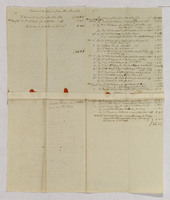 Account of Whitehall Overseer Joseph Porter with Benjamin Chew, December 1799
Account of Whitehall Overseer Joseph Porter with Benjamin Chew, December 1799 An account for Whitehall expenses with many payments to enslaved or potentially enslaved people. One of the first entries is payments to Negro Tom for 3 barkets (sp?), payments to Merrit and Prince (noting one man sick), payment to Naudain for "red coating for black child", money to James Hill for a "coffin for man" and another payment to him for making a "coffin for Old Lemon". Payments for molasses and vinegar for Aaron, and cash received from John Gibbs by "negro at door". Payment of one gallon of whiskey to Nodine for mowing, and other payments to him and Enos in foodstuffs and cash.
-
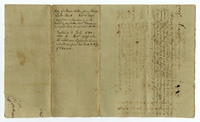 Copy of items taken from Whitehall Overseer George Ford's Book, December 5, 1793
Copy of items taken from Whitehall Overseer George Ford's Book, December 5, 1793 The note on the back of the document, presumably written by Benjamin Chew, Jr., states that there was a balance due from George Ford to Benjamin Chew of 64.2.10 pounds. There is also a statement from Ford confirming that he went through the account with Chew on November 29, 1797.
This is an extensive document of cash paid for labor, including harvest, mowing marsh hay and clover, and ditching. There are payments for all types of labor to "Negros" Nathan, Noke, David, John, Merrit, Mitch, Jack, and Mint.
-
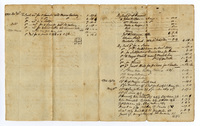 Copy of articles taken from Whitehall Overseer George Ford's Book, December 1793
Copy of articles taken from Whitehall Overseer George Ford's Book, December 1793 This account includes both labor and materials, as well as a "leive" for Negro Merrit (reason is illegible). Also includes lines for cash paid at Harvest to "Noke, a negro", Bob, and Toney.
-
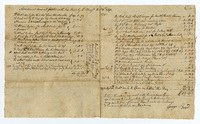 Whitehall accounts settled by Overseer George Ford, 1791-1792
Whitehall accounts settled by Overseer George Ford, 1791-1792 George Ford's Account for Benjamin Chew of expenses and labor at Whitehall. "Negroes" listed as paid cash include Charles, Cooper, Davy, and Steve. Other names possibly include John, Jack, Bill, and Tony, but they are not specified as Black or otherwise.
-
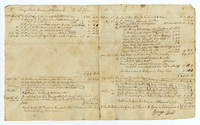 Whitehall accounts settled by Overseer George Ford, April 16, 1793
Whitehall accounts settled by Overseer George Ford, April 16, 1793 Account for Benjamin Chew of expenses and labor at Whitehall. Robert Denny is mentioned, as well as many names of "Negroes" under the harvest dated August 11, 1792. These individuals include Plato, Stephen, Jack, Toney, Jane, Noke, Lam, Nero, Merrit, and Sy, amongst others wth full names such as Rob Reeve, James Gallhorn, and John Green.
There is also a 3.13 pound credit for "mending Negro's shoes in the Winter 1791".
-
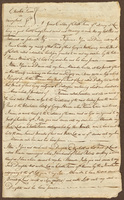 Will of James Calder of Chester Town, March 15, 1752
Will of James Calder of Chester Town, March 15, 1752 His son James is to be given law books, and to his wife "the Negroe woman" Celia and Candis, as well as his chaise and chaise horse. To son James, enslaved girl Jean, to son Alexander, enslaved boy Valentine, to daughter Elizabeth is enslaved girl Sil, and daughter Anne is to inherit enslaved girl Lidia. Until his son is of age, the aforementioned enslaved people are to "furnish" his wife.
The plantation, with its enslaved people and stock, is to be rented or placed under an overseer until his son and daughters come into possession of the land.
-
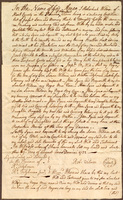 Will of Rebeckah Wilmer of Kent County, MD, 1722-1725
Will of Rebeckah Wilmer of Kent County, MD, 1722-1725 The will releases enslaved man James after keeping their mill for two years and having him "for the use" of her son and brother, declaring he "shall be free [from] Slavery and att [sic] his own disposal". The will then bequeaths enslaved man Vinn to her son, Lambert Wilmer, and enslaved boy Cezar to her son Simon Wilmer. It specifies that Vinn is to become property of her son Simon upon Lambert's death, and then free after Simon dies. Cezar is to "remain to" her daughter Rebeckah Wimer upon Simon's death.
-
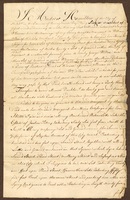 Will of Andrew Hamilton, 1745
Will of Andrew Hamilton, 1745 Andrew Hamilton of Philadelphia's will divides a large amount of land throughout modern day Society Hill, Philadelphia, as well as in Bucks County, amongst his children. To his son James and his heirs, he bequeaths "my Negroes" Isaac the gardiner [sic], Nanny & her daughter Cis, and Jerimiah.
There is also mention of his land at Whitehall to be given to his son Andrew, as well "negro Gusman" and his family. An enslaved woman named Sue and her two youngest children as well as an unnamed girl are given to two others.
-
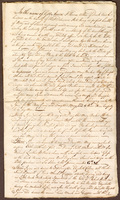 Will of Thomas Collins, Esq. of Kent County, April 25, 1789
Will of Thomas Collins, Esq. of Kent County, April 25, 1789 In addition to a great deal of land, money, and furniture to his sons and daughters and others, Collins leaves to his daughter Mary Barker "the time and service of one negro girl named Bet" until she reaches the age of 25, at which point Bet is to be freed. His daughter Elizabeth is bequeathed the "time and service of a negro girl named Sall", again until she is 25 years old and is to be freed from all enslavement.
-
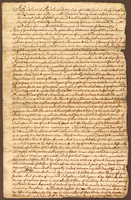 Will of Richard Richardson of Kent County, December 1730
Will of Richard Richardson of Kent County, December 1730 At the beginning of the will, Richardson states that his daughter Mary Waters is to be given "one negro girl named Maria". Continues to equally divide his multiple plantations between his wife and remaining children.
Includes a note at the end stating that it is his "will & desire" that his wife will have "for her own proper use my mallatto [sic] woman named Bess".
 Whitehall Account- cash paid & received, 1789-1797 Cash paid and received at Whitehall for labor, goods, and services for both free and enslaved people. Payments to Noke, Yarm, and Merrit for harvest, cutting wood, ditching, and mowing marsh hay. There is also a payment in Chew's handwriting to Jacob Hill for shoes for Sharper, and an entry to "articles bought for sick people" and a quart of brandy for Cato.
Whitehall Account- cash paid & received, 1789-1797 Cash paid and received at Whitehall for labor, goods, and services for both free and enslaved people. Payments to Noke, Yarm, and Merrit for harvest, cutting wood, ditching, and mowing marsh hay. There is also a payment in Chew's handwriting to Jacob Hill for shoes for Sharper, and an entry to "articles bought for sick people" and a quart of brandy for Cato. Doctor's bill for enslaved people at Duck Creek Crossroads, 1790 Dated "Anno Domini 1790", account between George Ford and James Jones for visits to enslaved people at Duck Creek Cross Roads [sic]. The first charge is for Negro Jacob on January 11, the second for "negro woman - Dick Butcher's Wife - Priscilla". Sharper, Scilla, Absalom, and Priscilla again.
Doctor's bill for enslaved people at Duck Creek Crossroads, 1790 Dated "Anno Domini 1790", account between George Ford and James Jones for visits to enslaved people at Duck Creek Cross Roads [sic]. The first charge is for Negro Jacob on January 11, the second for "negro woman - Dick Butcher's Wife - Priscilla". Sharper, Scilla, Absalom, and Priscilla again. Payment for new shoes for Negros at Whitehall, 1802-1803 A receipt of payment to "making two pairs of coarse shoes" for Enos and Cato, followed by "Negros"- unsure if that is referring to the two named men, or additional laborers. New shoes were also made for Aaron.
Payment for new shoes for Negros at Whitehall, 1802-1803 A receipt of payment to "making two pairs of coarse shoes" for Enos and Cato, followed by "Negros"- unsure if that is referring to the two named men, or additional laborers. New shoes were also made for Aaron. Note of payment from Joseph Porter to Merrit Allee for labor, marked by Merrit, September 05, 1799 Payment from Joseph Porter to Merrit Allee for "dikking and mowing". Signed with an "X" by Merrit.
Note of payment from Joseph Porter to Merrit Allee for labor, marked by Merrit, September 05, 1799 Payment from Joseph Porter to Merrit Allee for "dikking and mowing". Signed with an "X" by Merrit. Note of payment from George Ford to James Blundell potentially for medicine, September 03, 1976 Note of payment from George Ford to James Blundell potentially for medicine for Sharper, though the handwriting is not entirely clear.
Note of payment from George Ford to James Blundell potentially for medicine, September 03, 1976 Note of payment from George Ford to James Blundell potentially for medicine for Sharper, though the handwriting is not entirely clear. Payment to Dr. James Sykes for attending a Negro at Whitehall, 1800 A receipt of payment to Dr. James Sykes from Benjamin Orange for medicine and attending Lucy Butcher, referred to in the second line as Negro.
Payment to Dr. James Sykes for attending a Negro at Whitehall, 1800 A receipt of payment to Dr. James Sykes from Benjamin Orange for medicine and attending Lucy Butcher, referred to in the second line as Negro. Mary Barnet paid by Benjamin Chew for services as midwife to Negro woman, August 20, 1787 A receipt of payment to Mary Barnet from Benjamin Chew for four pounds and ten shillings for midwife services to a Negro woman at Whitehall. Signed by Mary with a mark in the shape of a "W".
Mary Barnet paid by Benjamin Chew for services as midwife to Negro woman, August 20, 1787 A receipt of payment to Mary Barnet from Benjamin Chew for four pounds and ten shillings for midwife services to a Negro woman at Whitehall. Signed by Mary with a mark in the shape of a "W". Note documenting purchases & hiring of two Negro workers for Whitehall, May-August 1789 Note documenting the hire of Negro girl Tish and Negro woman Cansall, as well as payment to Henry Hoa___? (Hoffecker?) "for making negro clothing".
Note documenting purchases & hiring of two Negro workers for Whitehall, May-August 1789 Note documenting the hire of Negro girl Tish and Negro woman Cansall, as well as payment to Henry Hoa___? (Hoffecker?) "for making negro clothing". Account of Whitehall Overseer Joseph Porter with Benjamin Chew, 1799 Account covering January-December 1799. Under expenses are the mending of something for Cato, and purchase of shoes for Yarm on February 8th. Jacob "Allee" for "making 4 suits of cloathes", payments to Pad, Prince, Yarm, and Merrit for different labor. Also an expense for 4 gallons of whiskey for the people cutting the marsh hay.
Account of Whitehall Overseer Joseph Porter with Benjamin Chew, 1799 Account covering January-December 1799. Under expenses are the mending of something for Cato, and purchase of shoes for Yarm on February 8th. Jacob "Allee" for "making 4 suits of cloathes", payments to Pad, Prince, Yarm, and Merrit for different labor. Also an expense for 4 gallons of whiskey for the people cutting the marsh hay. Account of Whitehall Overseer Joseph Porter with Benjamin Chew, 1802 Payment to Noke for reaping and Merrit and Simon for scouring meadow ditch (with a note reading "hired because our own people had no boots"). Another payment to Merrit for (cover__?) corn, and multiple payments to Yarm "Alee" (Allen?) for mowing.
Account of Whitehall Overseer Joseph Porter with Benjamin Chew, 1802 Payment to Noke for reaping and Merrit and Simon for scouring meadow ditch (with a note reading "hired because our own people had no boots"). Another payment to Merrit for (cover__?) corn, and multiple payments to Yarm "Alee" (Allen?) for mowing. Account of harvest workers at Whitehall from Joseph Porter to Benjamin Chew, 1801 To note the Different Days work and what is had to Each hand & the Day &c for Harvest work?. Noke and Yarm are mentioned, both with "Allen" after their names.
Account of harvest workers at Whitehall from Joseph Porter to Benjamin Chew, 1801 To note the Different Days work and what is had to Each hand & the Day &c for Harvest work?. Noke and Yarm are mentioned, both with "Allen" after their names. Account of Whitehall Overseer Joseph Porter with Benjamin Chew, January 11, 1803 An account for Whitehall expenses, both paid and received. One of the first lines of cash received is from Sam Calhoun for the purchase of his wife, Latitia. The first $30 for of a total $90 in three payments. Also recorded is cash received from Meredith for a year's wages of Beck, from 1802-1803, as well as multiple payments for various work by Merrit. There is also payment for half a gallon of wine for sick Aaron.
Account of Whitehall Overseer Joseph Porter with Benjamin Chew, January 11, 1803 An account for Whitehall expenses, both paid and received. One of the first lines of cash received is from Sam Calhoun for the purchase of his wife, Latitia. The first $30 for of a total $90 in three payments. Also recorded is cash received from Meredith for a year's wages of Beck, from 1802-1803, as well as multiple payments for various work by Merrit. There is also payment for half a gallon of wine for sick Aaron. Account of Whitehall Overseer Joseph Porter with Benjamin Chew, 1789 Detailed account for Whitehall expenses from 1789 with many payments to enslaved or potentially enslaved people for various work. Also includes payment for use of other's (hired?) enslaved people, such as a payment on May 2nd to Charles Nabb "for use of Merrit Lee". Other work includes Prince, Lid, George, and Merrit for harvesting and ditching, and Jem for cradling oats, Raymond for an ox yoke & bows, and Negro List (sp?) for stocking [?]. Sam Calhoun is also mentioned.
Account of Whitehall Overseer Joseph Porter with Benjamin Chew, 1789 Detailed account for Whitehall expenses from 1789 with many payments to enslaved or potentially enslaved people for various work. Also includes payment for use of other's (hired?) enslaved people, such as a payment on May 2nd to Charles Nabb "for use of Merrit Lee". Other work includes Prince, Lid, George, and Merrit for harvesting and ditching, and Jem for cradling oats, Raymond for an ox yoke & bows, and Negro List (sp?) for stocking [?]. Sam Calhoun is also mentioned. Account of Whitehall Overseer Joseph Porter with Benjamin Chew, January 07, 1804 Account for work done by Joseph Porter's wife, Sarah, starting in 1798, making clothes for the enslaved people of Whitehall. The work includes making a suit of linen for Dave, a coat for Ben, a pair of breaks for Jim, and many other shirts, trousers, suits of clth, and coats.
Account of Whitehall Overseer Joseph Porter with Benjamin Chew, January 07, 1804 Account for work done by Joseph Porter's wife, Sarah, starting in 1798, making clothes for the enslaved people of Whitehall. The work includes making a suit of linen for Dave, a coat for Ben, a pair of breaks for Jim, and many other shirts, trousers, suits of clth, and coats. Account of Whitehall Overseer Joseph Porter with Benjamin Chew, 1804 Begins with another cash received for the purchase by "Negro Sam Calhoun" for his wife, for a total of $90 in three payments of $30. The second line is payment from John Gibbs at Dover for the hire of "Negro Beck". There is also payment from Dover for the hiring of Lucey [Lucy] in 1801. Towards the end is a payment for a doctor for Aaron "for curing him some time ago", and payment to Sarah Porter (Joseph's wife) for "sundry Taylor's [tailor] work making Negroe's cloaths".
Account of Whitehall Overseer Joseph Porter with Benjamin Chew, 1804 Begins with another cash received for the purchase by "Negro Sam Calhoun" for his wife, for a total of $90 in three payments of $30. The second line is payment from John Gibbs at Dover for the hire of "Negro Beck". There is also payment from Dover for the hiring of Lucey [Lucy] in 1801. Towards the end is a payment for a doctor for Aaron "for curing him some time ago", and payment to Sarah Porter (Joseph's wife) for "sundry Taylor's [tailor] work making Negroe's cloaths". Account of Whitehall Overseer Joseph Porter with Benjamin Chew, December 1799 An account for Whitehall expenses with many payments to enslaved or potentially enslaved people. One of the first entries is payments to Negro Tom for 3 barkets (sp?), payments to Merrit and Prince (noting one man sick), payment to Naudain for "red coating for black child", money to James Hill for a "coffin for man" and another payment to him for making a "coffin for Old Lemon". Payments for molasses and vinegar for Aaron, and cash received from John Gibbs by "negro at door". Payment of one gallon of whiskey to Nodine for mowing, and other payments to him and Enos in foodstuffs and cash.
Account of Whitehall Overseer Joseph Porter with Benjamin Chew, December 1799 An account for Whitehall expenses with many payments to enslaved or potentially enslaved people. One of the first entries is payments to Negro Tom for 3 barkets (sp?), payments to Merrit and Prince (noting one man sick), payment to Naudain for "red coating for black child", money to James Hill for a "coffin for man" and another payment to him for making a "coffin for Old Lemon". Payments for molasses and vinegar for Aaron, and cash received from John Gibbs by "negro at door". Payment of one gallon of whiskey to Nodine for mowing, and other payments to him and Enos in foodstuffs and cash. Copy of items taken from Whitehall Overseer George Ford's Book, December 5, 1793 The note on the back of the document, presumably written by Benjamin Chew, Jr., states that there was a balance due from George Ford to Benjamin Chew of 64.2.10 pounds. There is also a statement from Ford confirming that he went through the account with Chew on November 29, 1797. This is an extensive document of cash paid for labor, including harvest, mowing marsh hay and clover, and ditching. There are payments for all types of labor to "Negros" Nathan, Noke, David, John, Merrit, Mitch, Jack, and Mint.
Copy of items taken from Whitehall Overseer George Ford's Book, December 5, 1793 The note on the back of the document, presumably written by Benjamin Chew, Jr., states that there was a balance due from George Ford to Benjamin Chew of 64.2.10 pounds. There is also a statement from Ford confirming that he went through the account with Chew on November 29, 1797. This is an extensive document of cash paid for labor, including harvest, mowing marsh hay and clover, and ditching. There are payments for all types of labor to "Negros" Nathan, Noke, David, John, Merrit, Mitch, Jack, and Mint. Copy of articles taken from Whitehall Overseer George Ford's Book, December 1793 This account includes both labor and materials, as well as a "leive" for Negro Merrit (reason is illegible). Also includes lines for cash paid at Harvest to "Noke, a negro", Bob, and Toney.
Copy of articles taken from Whitehall Overseer George Ford's Book, December 1793 This account includes both labor and materials, as well as a "leive" for Negro Merrit (reason is illegible). Also includes lines for cash paid at Harvest to "Noke, a negro", Bob, and Toney. Whitehall accounts settled by Overseer George Ford, 1791-1792 George Ford's Account for Benjamin Chew of expenses and labor at Whitehall. "Negroes" listed as paid cash include Charles, Cooper, Davy, and Steve. Other names possibly include John, Jack, Bill, and Tony, but they are not specified as Black or otherwise.
Whitehall accounts settled by Overseer George Ford, 1791-1792 George Ford's Account for Benjamin Chew of expenses and labor at Whitehall. "Negroes" listed as paid cash include Charles, Cooper, Davy, and Steve. Other names possibly include John, Jack, Bill, and Tony, but they are not specified as Black or otherwise. Whitehall accounts settled by Overseer George Ford, April 16, 1793 Account for Benjamin Chew of expenses and labor at Whitehall. Robert Denny is mentioned, as well as many names of "Negroes" under the harvest dated August 11, 1792. These individuals include Plato, Stephen, Jack, Toney, Jane, Noke, Lam, Nero, Merrit, and Sy, amongst others wth full names such as Rob Reeve, James Gallhorn, and John Green. There is also a 3.13 pound credit for "mending Negro's shoes in the Winter 1791".
Whitehall accounts settled by Overseer George Ford, April 16, 1793 Account for Benjamin Chew of expenses and labor at Whitehall. Robert Denny is mentioned, as well as many names of "Negroes" under the harvest dated August 11, 1792. These individuals include Plato, Stephen, Jack, Toney, Jane, Noke, Lam, Nero, Merrit, and Sy, amongst others wth full names such as Rob Reeve, James Gallhorn, and John Green. There is also a 3.13 pound credit for "mending Negro's shoes in the Winter 1791". Will of James Calder of Chester Town, March 15, 1752 His son James is to be given law books, and to his wife "the Negroe woman" Celia and Candis, as well as his chaise and chaise horse. To son James, enslaved girl Jean, to son Alexander, enslaved boy Valentine, to daughter Elizabeth is enslaved girl Sil, and daughter Anne is to inherit enslaved girl Lidia. Until his son is of age, the aforementioned enslaved people are to "furnish" his wife. The plantation, with its enslaved people and stock, is to be rented or placed under an overseer until his son and daughters come into possession of the land.
Will of James Calder of Chester Town, March 15, 1752 His son James is to be given law books, and to his wife "the Negroe woman" Celia and Candis, as well as his chaise and chaise horse. To son James, enslaved girl Jean, to son Alexander, enslaved boy Valentine, to daughter Elizabeth is enslaved girl Sil, and daughter Anne is to inherit enslaved girl Lidia. Until his son is of age, the aforementioned enslaved people are to "furnish" his wife. The plantation, with its enslaved people and stock, is to be rented or placed under an overseer until his son and daughters come into possession of the land. Will of Rebeckah Wilmer of Kent County, MD, 1722-1725 The will releases enslaved man James after keeping their mill for two years and having him "for the use" of her son and brother, declaring he "shall be free [from] Slavery and att [sic] his own disposal". The will then bequeaths enslaved man Vinn to her son, Lambert Wilmer, and enslaved boy Cezar to her son Simon Wilmer. It specifies that Vinn is to become property of her son Simon upon Lambert's death, and then free after Simon dies. Cezar is to "remain to" her daughter Rebeckah Wimer upon Simon's death.
Will of Rebeckah Wilmer of Kent County, MD, 1722-1725 The will releases enslaved man James after keeping their mill for two years and having him "for the use" of her son and brother, declaring he "shall be free [from] Slavery and att [sic] his own disposal". The will then bequeaths enslaved man Vinn to her son, Lambert Wilmer, and enslaved boy Cezar to her son Simon Wilmer. It specifies that Vinn is to become property of her son Simon upon Lambert's death, and then free after Simon dies. Cezar is to "remain to" her daughter Rebeckah Wimer upon Simon's death. Will of Andrew Hamilton, 1745 Andrew Hamilton of Philadelphia's will divides a large amount of land throughout modern day Society Hill, Philadelphia, as well as in Bucks County, amongst his children. To his son James and his heirs, he bequeaths "my Negroes" Isaac the gardiner [sic], Nanny & her daughter Cis, and Jerimiah. There is also mention of his land at Whitehall to be given to his son Andrew, as well "negro Gusman" and his family. An enslaved woman named Sue and her two youngest children as well as an unnamed girl are given to two others.
Will of Andrew Hamilton, 1745 Andrew Hamilton of Philadelphia's will divides a large amount of land throughout modern day Society Hill, Philadelphia, as well as in Bucks County, amongst his children. To his son James and his heirs, he bequeaths "my Negroes" Isaac the gardiner [sic], Nanny & her daughter Cis, and Jerimiah. There is also mention of his land at Whitehall to be given to his son Andrew, as well "negro Gusman" and his family. An enslaved woman named Sue and her two youngest children as well as an unnamed girl are given to two others. Will of Thomas Collins, Esq. of Kent County, April 25, 1789 In addition to a great deal of land, money, and furniture to his sons and daughters and others, Collins leaves to his daughter Mary Barker "the time and service of one negro girl named Bet" until she reaches the age of 25, at which point Bet is to be freed. His daughter Elizabeth is bequeathed the "time and service of a negro girl named Sall", again until she is 25 years old and is to be freed from all enslavement.
Will of Thomas Collins, Esq. of Kent County, April 25, 1789 In addition to a great deal of land, money, and furniture to his sons and daughters and others, Collins leaves to his daughter Mary Barker "the time and service of one negro girl named Bet" until she reaches the age of 25, at which point Bet is to be freed. His daughter Elizabeth is bequeathed the "time and service of a negro girl named Sall", again until she is 25 years old and is to be freed from all enslavement. Will of Richard Richardson of Kent County, December 1730 At the beginning of the will, Richardson states that his daughter Mary Waters is to be given "one negro girl named Maria". Continues to equally divide his multiple plantations between his wife and remaining children. Includes a note at the end stating that it is his "will & desire" that his wife will have "for her own proper use my mallatto [sic] woman named Bess".
Will of Richard Richardson of Kent County, December 1730 At the beginning of the will, Richardson states that his daughter Mary Waters is to be given "one negro girl named Maria". Continues to equally divide his multiple plantations between his wife and remaining children. Includes a note at the end stating that it is his "will & desire" that his wife will have "for her own proper use my mallatto [sic] woman named Bess".